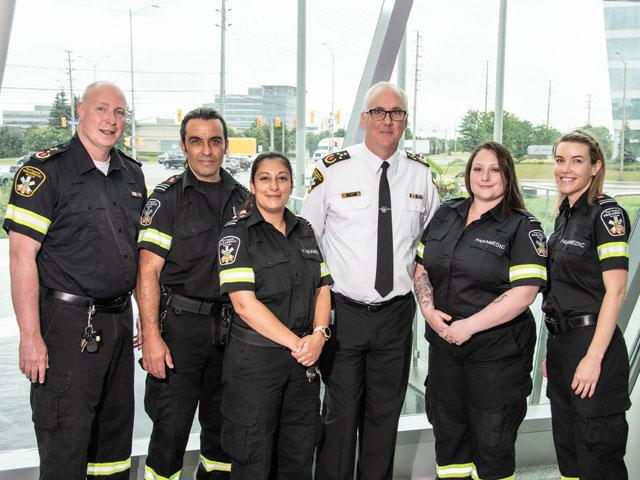Our team
We provide residents and those visiting Peel with expert, reliable pre-hospital medical care. We deliver compassionate treatment while safeguarding the wellness of our community.
Every time someone calls 911 in Peel, it sets off a chain of events. Within minutes paramedics will be on their way.
Their years of schooling and advanced training mean they can help in several ways. For example, they can:
- Give life-saving drugs and pain relievers.
- Open blocked airways.
- Control severe bleeding.
- Manage injuries to a spine, neck, or other bones.
- Treat life-threatening allergic reactions.
- Start an IV to deliver medications.
- Deliver babies in emergency situations.
- Provide CPR and other support to heart-attack and cardiac arrest victims.
Saving lives on the go
Paramedics don't just treat patients on scene. Their job continues inside the ambulance where they use a variety of equipment to keep patients alive. There are:
- Oxygen tanks to help patients breathe.
- Cardiac monitors to keep track of patient vital signs.
- Hundreds of basic items such as bandages and syringes to help patients feel better.
More than CPR
It's not just the life-saving things paramedics do that matter. Holding a patient's hand or reassuring a frightened family member can make a difference too. Sometimes kindness is the best medicine.
Collaborative care
Paramedics are good at working on their own. Sometimes they collaborate with other health care professionals.
On scene, they can call medical specialists to discuss treatments. On the way to the hospital, they inform emergency room (ER) staff of their patient's condition. This makes it easier for doctors and nurses to prepare for their arrival.
At the ER, paramedics can help provide CPR or ventilate a patient so nurses and respiratory therapists can focus on other tasks. They can also help intubate patients; set up and administer medication; and calm down aggressive patients.
After the call
Once their patient is safely under the care of ER staff, paramedics complete an ambulance call report. Then they’re off to a station to wait for the next emergency.
Interested in becoming a paramedic?
Get details about the education, training, and application requirements needed to join our team.
Logistics technicians work 24 hours a day, 7 days a week to make sure paramedics have everything they need to help you. They:
- Deep clean and disinfect ambulances so they're safe for patients.
- Keep ambulances fully stocked with life-saving equipment.
- Check and recheck every medication.
- Oversee maintenance and repairs.
- Decontaminate ambulances after high-risk calls, such as COVID-19 transfers.
Whether you're on the frontlines or behind the scenes, it takes a team to save a life.
Interested in becoming a logistics technician?
Get details about the education, training, and application requirements needed to join our team.
Peel Regional Paramedic Services also has a group of commanders, managers, superintendents, supervisors, specialists, analysts, and coordinators, led by a chief and deputy chief.
Operations
- This group of commanders, superintendents, schedulers, and paramedics ensure you get help in an emergency.
- Together with partners (police and fire departments; hospitals; and the Mississauga Central Ambulance Communication Centre), they keep the 911 system running 24/7.
- Also responsible for community programs and outreach.
Culture and engagement
- Manages programs that support the well-being of our employees.
- Work includes implementing Culture of Safety and other initiatives to support a mentally healthy and safe workplace.
Logistics
- Responsible for our ambulances, equipment, and supplies.
- Whatever a paramedic needs, from soap to drugs to defibrillators, it's managed by them.
Education and research
- Leads the ongoing training and recertification of paramedics.
- Oversees our participation in research studies.
Risk and audit
- Keeps us aligned with the rules and guidelines of regulatory agencies such as the Ministry of Health.
- Follows up on patient feedback.
- Gathers and analyses data so we can monitor how we're doing and make improvements.
